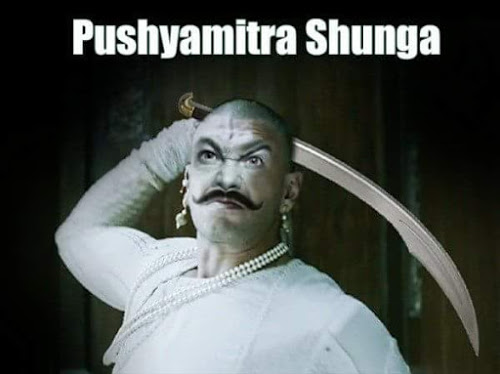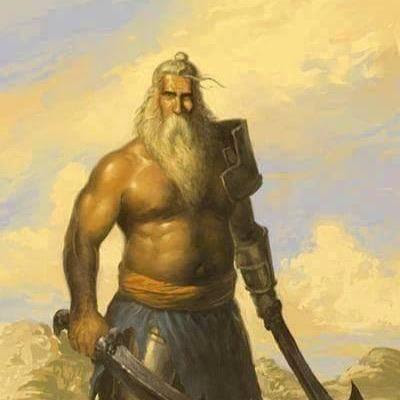
There have been many great
kings in the year of India, which are described in historical literature.
Pushyamitra Sung, one of the
most glorious kings in Indian history, Pushyamitra Sung, who started the Sunga
dynasty, was a Brahmin by birth and a Kshatriya by deeds, he was appointed by
Brihadratha, the last ruler of the Maurya dynasty, as his general.
However, Pushyamitra Sunga
re-established Vedic religion in India by killing Brihadratha and ending the
Mauryan Empire.
Why and how did Pushpamitra Sunga end the Maurya Empire?
let's know
After Emperor Ashoka's Kalinga conquest, he changed his whole life in the propagation and conduct of Buddhism.
Due to the Buddhism adopted by
Ashoka, the entire Mauryan empire was overcome with violence, taking advantage
of it, small states of the empire started trying to make themselves
independent.
As a result, the Mauryan Empire
was weakened until the death of Ashoka and becoming the last Mauryan ruler of
Vrihadratha. At the same time, by this time the entire Magadha Empire had
converted to Buddhism.
It was difficult to believe,
but the land that defeated the warriors like Alexander and Sailucus had lost
its heroic nature, now the foreign forces were dominating India, as the Greek
army entered the kingdom, the only reason. Non-violent policies of Buddhism.
During this, the commander
Pushyamitra went to check the monasteries along with his soldiers without the
king's permission. Where Greek soldiers were caught from the monasteries during
the investigation. He was put to death on seeing this.
On seeing this action, the king wanted to know
the reason from his commander, how can he kill people without the permission of
the king.

The commander Pushyamitra joined the
public and the army on the work done to protect the state and after the king
died in the clash with the king, the commander Pushyamitra was made the king,
thus the first Brahmin of any state in Indian history The kingdom begins. Whose
name was the Sunga dynasty.
origine
of shunga
According to the Ashtadhyayi of
Patanjali and Panini in the Mahabhashya, "Pushyamitra Sunga" was a
Brahmin of the Bharadwaja gotra. As a solution to this problem, JC Ghosh
described him as "Daiyamushiyan", which is considered to be a Dvaita
gotra of Brahmins. According to him, the Daiyamushayana or Dait gotra is a
Brahmin gotra composed of a mixture of two different alga gotras i.e. father
and quantity gotra (here Bharadwaja and Kashyapa). Such Brahmins can keep both
gotras as their identity. These dynasties are believed to belong to Ujjain in
Madhya Pradesh, who were in the service of Maurya.
Pushyamitra's governance arrangement
The capital of the empire was Pataliputra. Later, after changing the capital to Vidisha, Pushyamitra was able to secure the intermediate part of the ancient Mauryan Empire. Pushyamitra's empire spread from the Himalayas in the north to Berar in the south and from Punjab in the west to Magadha in the east. According to Divyavadan and Taranath, Jalandhar and Syalkot also had their rights. In various parts of the empire, the tradition of appointing Rajkumar or Rajkula's people as governors continued. Pushyamitra had appointed his sons as co-rulers in various regions of the empire. And his son Agnimitra was the son of Vidisha. Dhanadev was the governor of Kaushal. Rajkumar ji was also the director of the army. Even at this time village was the smallest unit of governance.

The state
shown is of 185 BC and in 149 BC its expansion spread far to the west and
south.
By this
time, by the time Mauryan central control was relaxed and the trend of
feudalization started becoming active.
The reign of the Sunga dynasty lasted from
185 BC to 149 BC.
The great
Pushyamitra Sunga who re-established Sanatan Dharma
In the post-Mauryan period Pushyamitra
was the first king who performed many tasks according to the Indian Sanatana
Dharma, such as Ashwamedha Yagya, an Ashwamedha Yajna was performed at the last
and final time of Pushyamitra, which was completed by Maharishi Patanjali.
It is said about some of the 84
thousand stupas offered by Emperor Ashoka.
Was also broken. Which questions his
greatness, however, the construction work of some Buddhist stupas by
Pushyamitra Sunga also comes up such as - Bharhut Stupa which is in Satna
district of Madhya Pradesh.
And Sanchi Stupa, which is located in
Raisen, Madhya Pradesh, which was constructed by Emperor Ashoka, got it
renovated.
After Chandragupta Maurya, the reign of the Greeks which was most invaded was Pushyamitra Sunga. King Minander of the great Greek dynasty Demetrius, known as Milind in Buddhist literature, was also defeated by Pushyamitra. It is said about Minander that its empire was bigger than Alexander the Great. During Pushyamitra Sung, it was impossible for any foreign power to enter India in the year, Pushyamitra Sung ruled for a total of 36 years and a total of 10 rulers.

The present form of Manusmriti was also
composed during this Sunga period. India also gained knowledge of astrology and
Gandhara style.The present form of Manusmriti was also composed during this
Sunga period. India also gained knowledge of astrology and Gandhara style.
We sincerely hope that you have liked this article of ours. If you find any flaws in it or you want to give any suggestion, then you must comment below. Apart from this, do not forget to share any of your thoughts through a comment for us. Share this blog post as much as possible |




No comments:
Post a Comment
If you have any doubts, please let me know